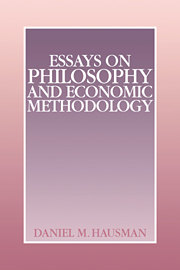Book contents
- Frontmatter
- Contents
- Introduction: What is philosophy of economics?
- PART I METHODOLOGY AND THEORY APPRAISAL
- 1 Economic methodology in a nutshell
- 2 On the conceptual structure of neoclassical economics – a philosopher's view
- 3 John Stuart Mill's philosophy of economics
- 4 The deductive method
- 5 Why look under the hood?
- 6 An appraisal of Popperian methodology
- 7 Is falsificationism unpractised or unpractisable?
- 8 The limits of economic science
- PART II CAUSALITY IN ECONOMICS
- PART III CASES AND PUZZLES
- PART IV POSTSCRIPTS
- Bibliography of relevant writings by Daniel M. Hausman
- Bibliography of works by other authors
- Index
4 - The deductive method
Published online by Cambridge University Press: 05 June 2012
- Frontmatter
- Contents
- Introduction: What is philosophy of economics?
- PART I METHODOLOGY AND THEORY APPRAISAL
- 1 Economic methodology in a nutshell
- 2 On the conceptual structure of neoclassical economics – a philosopher's view
- 3 John Stuart Mill's philosophy of economics
- 4 The deductive method
- 5 Why look under the hood?
- 6 An appraisal of Popperian methodology
- 7 Is falsificationism unpractised or unpractisable?
- 8 The limits of economic science
- PART II CAUSALITY IN ECONOMICS
- PART III CASES AND PUZZLES
- PART IV POSTSCRIPTS
- Bibliography of relevant writings by Daniel M. Hausman
- Bibliography of works by other authors
- Index
Summary
From the 1830s, when Nassau Senior (1836) and John Stuart Mill (1836) first wrote on economic methodology, until the 1930s, when positivist views become ascendent, there was a strong consensus among economists that economic methodology was in fact and ought to be deductive (see also, for example, Cairnes 1875 and Keynes 1917). The basic premises of economics – claims such as that people prefer more goods and services to fewer or the law of diminishing marginal utility – are established by introspection, casual experience, or direct test, and the rest of economics is then deduced from these established “laws” and descriptions of the particular material, institutional, and informational circumstances.
In the 1930s Lionel Robbins provided the following vivid statement of this view:
The propositions of economic theory, like all scientific theory, are obviously deductions from a series of postulates. … The main postulate of the theory of value is the fact that individuals can arrange their preferences in an order, and in fact do so. … These are not postulates the existence of whose counterpart in reality admits of extensive dispute once their nature is fully realized. We do not need controlled experiments to establish their validity: they are so much the stuff of our everyday experience that they have only to be stated to be recognized as obvious.
(1935, 78–79)J. J. Klant (1984, 56ff) aptly labels this view “empirical a priorism” (as opposed to the straight a priorism of von Mises [1981] and his followers).
- Type
- Chapter
- Information
- Essays on Philosophy and Economic Methodology , pp. 54 - 69Publisher: Cambridge University PressPrint publication year: 1992



